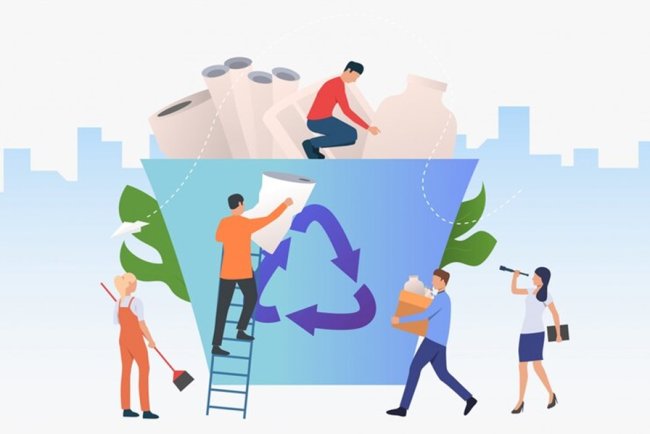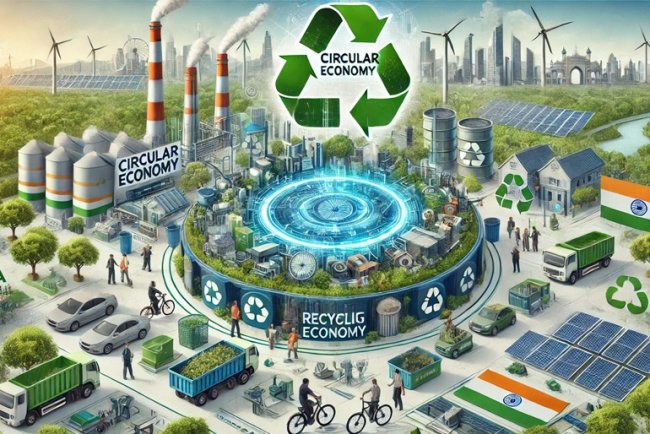Global Recycling Day: Call For Sustainable Circular Future
Global Recycling Day serves as a reminder with a clear, restorative message: waste is not always a nuisance but can be a value-realisation opportunity to reduce dependency on raw materials and build resilient systems

With increasing world populations and economies, so does waste and the proportion recycled. In the European Union, the recycling rate (excluding large mineral waste) increased from 42 per cent in 2010 to 46 per cent by 2020. Recent growth of the recycling sector has been driven by increased public education, increased industrial application of recycling products, and robust public policy and business investment. Recycling has been a way of reclaiming value from what would otherwise be discarded for a long time, providing livelihoods to many poor people, particularly in developing nations where there are few opportunities for decent life and labour.
Waste is not waste; it’s a resource to be maximised, said Prashant Singh, Co-Founder & CEO of Blue Planet Environmental Solutions. Therefore, it would be an investment in the technology that will facilitate the company in recycling, upcycling, upwardly infusing material, and getting one step closer towards the zero-landfill milestone. This captures the way in which India is adopting a circular economy where recycling is becoming an important growth impetus for economic development, sustainable environment, and maximum utilization of resources.
Global Recycling Day serves as a reminder with a clear, restorative message: waste is not always a nuisance but can be a value-realisation opportunity to reduce dependency on raw materials and build resilient systems for future generations. It would really need the right policies, investments, and technologies to make industries recycling hubs, create jobs, and sustain added sustainability goals.
Abhishek Agashe, Co-founder & CEO at Elima, said, “On Global Recycling Day, we must recognise that recycling is not just about waste management—it’s an economic imperative and rather the cornerstone of India’s transition to a circular economy and a key driver for achieving Viksit Bharat 2047. Efficient systems built towards channelizing India’s waste will also help propel India’s built environment and enhance everyone’s quality of life.”
The sector has so much potential, yet the recycling industry is facing revenue issues and minimal profitability due to high operational costs and limited access to funding. Agashe added that the formal recognition of recycling as an industry is long overdue, and with the right policy framework, it can create employment, drive economic growth, and reduce raw material dependency. “We also believe a structured approach, including Recycling-Linked Incentive Schemes (RLI) and allocation of industrial lands for recycling plant setups as part of the State Industrial Policy, will optimize reverse logistics and strengthen India’s waste-to-value ecosystem. In addition, measures like a capital subsidy on recycling machinery and soft loans for infrastructure can spur scale-up and render investments in the sector more attractive."
To ensure the circular economy is more robust and vibrant, the Environment Ministry's Draft Extended Producer Responsibility (EPR) Rules, 2024, will be rolled out by 2026. Under these rules, producers will be made responsible for packaging waste management, recycling, and giving incentives for eco-friendly practices. It is the demand of the time. A strong Extended Producer Responsibility (EPR) system has the potential to drive this revolution by incorporating sustainability into product development, closed-loop supply chains, and waste-to-value approaches. Circular leadership countries have achieved an up to 4% rise in GDP using resource-efficient measures.". India can also access a $4.5 trillion economic opportunity by 2030 if it puts waste recycling and material recovery at the forefront of policymakers and business agendas, according to Agashe.
The flexible plastics market dominates India's consumer packaing market at around 70% of the total plastic packing—with most being used as singles. Flexibe plastic film in packaging of wastes has been found to account for around 90% of the packaging of plastic trash.. With three out of four FMCG products in India packaged in flexible formats, this represents a critical sustainability challenge as the dominant mechanical recycling method largely works well for rigid plastics like PET.
PolyCycl has shared some numbers and said that the urgent need of the hour is to invest in scalable, technology-driven chemical recycling solutions to address this crisis. Chemical recycling significantly reduces fossil resource consumption (by 75-90%), lowers greenhouse gas emissions (by 40%+ vis-à-vis incineration of plastics), and mitigates both marine and terrestrial pollution.
As a circular economy technology startup, PolyCycl has been at the forefront of recycling single-use plastics. The company has led efforts spanning over a decade, developing the PolyCycl Contiflow Cracker Generation VI—a patented chemical recycling pyrolysis technology that enables a true plastic-to-plastic circular economy. This breakthrough technology converts hard-to-recycle plastics, such as single-use polythene bags and packaging films, into circular feedstocks for manufacturing new food-grade plastics, sustainable fuels, and renewable chemicals. The technology enables large-capacity plants having multiple modular lines, each capable of processing 75–100 tons per day of waste plastic feedstock.
This fully continuous conversion process ensures scalability and economic efficiency, with capital costs that are 50–75% lower than global counterparts, while also enabling low operational costs and project EBITDA exceeding 50%.
The sector has so much potential, yet recycling industry is facing revenue issues and minimal profitability due to high operational costs, limited access to funding.
[email protected]
What's Your Reaction?
















